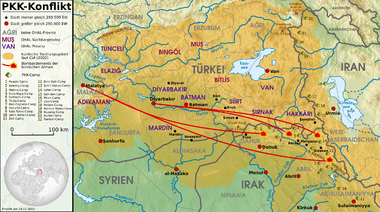Kurdish–Turkish conflict (1978–present) facts for kids
The Kurdish–Turkish conflict is a long-running armed conflict between Turkey and various Kurdish groups. These groups have sought either to create an independent Kurdistan or to gain more autonomy and better rights for Kurds within Turkey.
The main group involved is the Kurdistan Workers' Party (PKK). Most of the fighting has happened in southeastern Turkey, which Kurds call Northern Kurdistan. The PKK's presence in Iraqi Kurdistan and Syrian Kurdistan has led to Turkey carrying out military actions in those areas too. This conflict has cost Turkey a lot of money, estimated at hundreds of billions of dollars, mainly due to military expenses. It has also affected tourism in Turkey.
Quick facts for kids PKK–Turkish conflict (1978–present) |
|||||||
|---|---|---|---|---|---|---|---|
| Part of the Kurdish–Turkish conflict | |||||||
 Overview of the Kurdish – Turkish conflict (2010) |
|||||||
|
|||||||
| Belligerents | |||||||
* Navy EOD * Navy SF
Other forces:
Supported by:
|
Support (incl. alleged by Turkey):
|
||||||
| Strength | |||||||
| Turkish Armed Forces: 639,551: Gendarmerie: 148,700 Police: 225,000 Village Guards: 65,000 (not all directly involved in the conflict) |
PKK: 4,000–32,800 PJAK: 1,000–3,000 TAK: A few dozen Total: ≈5,000–32,800 |
||||||
| Casualties and losses | |||||||
| Before 2015: 5,347 soldiers, 283 police officers and 1,466 village guards killed, 95 captured (24 currently held) 2015–present: 1,166 killed Total: 8,266 killed and 21,128 wounded |
Total: 43,019–47,074 killed and 22,703+ captured |
||||||
|
Total killed: 55,000–60,000 Civilian casualties: 6,741 killed and 14,257 wounded by the PKK until 2015 (Turkish government claim) 2,400–4,000+ villages destroyed by the Turkish government |
|||||||
How the Conflict Started
The PKK was formed in 1978 by Kurdish students led by Abdullah Öcalan. Their main reason was the way Kurds were treated in Turkey. At that time, using the Kurdish language, traditional clothes, folklore, and names was not allowed in Kurdish areas.
To try and deny the existence of Kurds, the Turkish government called them "Mountain Turks" in the 1930s and 1940s. The words "Kurds" and "Kurdistan" were officially banned. After a military takeover in 1980, the Kurdish language was forbidden in public and private life until 1991. Many people who spoke, published, or sang in Kurdish were arrested.
A Fight for Rights
The PKK was created to gain language, cultural, and political rights for the Kurdish minority in Turkey. However, the full-scale conflict did not begin until August 15, 1984. That's when the PKK announced a Kurdish uprising. Since the conflict began, more than 40,000 people have died. Most of them were Kurdish civilians. Both sides have been accused of harming human rights during the conflict.
Peace Attempts and Renewed Fighting
In February 1999, PKK leader Abdullah Öcalan was arrested and taken to Turkey. He is still in prison on an island. The first part of the conflict lasted until March 1993, when the PKK announced a ceasefire. But fighting started again later that year.
In 2013, the Turkish government began talks with Öcalan. After some secret negotiations, a ceasefire was mostly successful between the Turkish state and the PKK. On March 21, 2013, Öcalan announced the "end of armed struggle" and called for peace talks.
However, on July 25, 2015, the conflict started again. The Turkish Air Force bombed PKK positions in Iraq. This happened because of tensions related to Turkey's involvement in the conflict in Syria. Large parts of many Kurdish-majority cities in Turkey were destroyed in the clashes that followed.
See also
 In Spanish: Insurgencia kurda en Turquía para niños
In Spanish: Insurgencia kurda en Turquía para niños
- Iraqi–Kurdish conflict
- Iranian–Kurdish conflict
- Syrian-Kurdish conflict
- Iraq–Turkey border
- List of Turkish Armed Forces operations in Northern Iraq
- Maoist insurgency in Turkey
- Turkish involvement in the Syrian Civil War
 | Isaac Myers |
 | D. Hamilton Jackson |
 | A. Philip Randolph |

